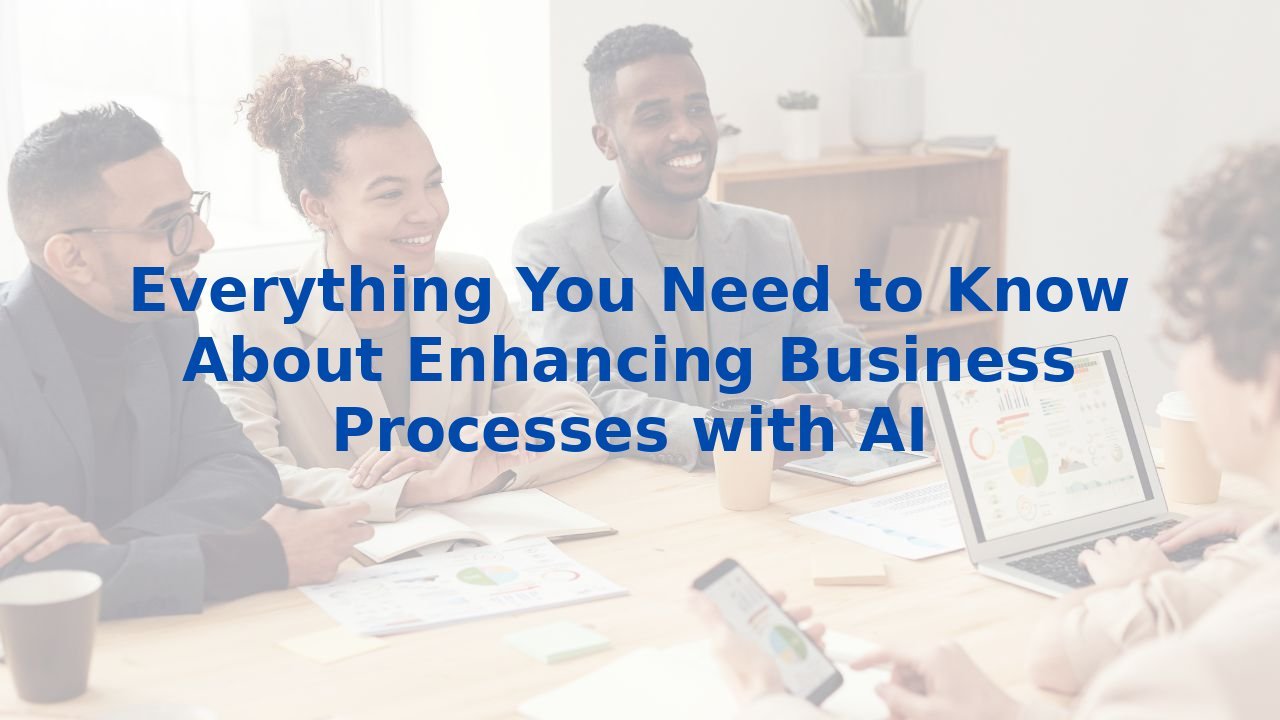Everything You Need To Know About Enhancing Business Processes with AI
Everything You Need To Know About Enhancing Business Processes with AI
In a landscape defined by rapid technological advancement, businesses must be agile, innovative, and strategic. Among the most transformative forces driving operational success today is Artificial Intelligence (AI). By embedding AI into various business processes, organizations can not only enhance efficiency but also reshape their operational DNA, ensuring they stay ahead in a competitive market landscape.
1. Process Discovery and Mapping
The journey towards operational excellence begins with understanding and refining existing workflows. AI’s role in Process Discovery is paramount, as it utilizes advanced algorithms to sift through vast amounts of operational data. This helps identify inefficiencies that may remain hidden without such technology. This capability is often achieved through Process Mining, a technique that reveals how data flows across systems and highlights patterns that can be fine-tuned for optimum performance.
Once discrepancies are identified, AI Process Mapping breathes life into the insights gained. By visualizing workflows, AI clarifies how processes interconnect and spotlights areas experiencing friction. This ensures that documentation remains dynamic and reflective of real-time operations, equipping organizations with a blueprint for continuous improvement.
2. Process Automation
Perhaps the most visible impact of AI in business processes is its ability to automate routine tasks. Through tools like Robotic Process Automation (RPA), businesses can delegate repetitive, rule-based activities to AI systems. The true power of this automation is two-fold: it not only increases the speed and accuracy of operations but also liberates team members to engage in strategic initiatives rather than mundane tasks.
Imagine a scenario where data entry and customer inquiries are handled seamlessly by AI—this not only boosts productivity but also elevates the quality of human contributions, allowing employees to innovate and add tangible value.
3. Continuous Improvement
As businesses evolve, so too must their processes. AI plays a crucial role in fostering a culture of continuous improvement. It provides persistent feedback through data-driven insights, enabling organizations to make iterative enhancements. By leveraging AI feedback loops, businesses can navigate the complexities of growth, ensuring that their strategies remain aligned with objectives and market demands.
4. Data Analysis and Decision-Making
In the age of information, data is a pivotal asset. AI’s capability to rapidly analyze and organize massive datasets enables swift decision-making. By predicting outcomes and identifying patterns, AI allows businesses to extract actionable insights. This speedy analysis translates into better tactical and strategic choices—giving organizations the foresight they need to thrive.
5. Real-Time Monitoring and Risk Detection
No longer do businesses need to operate in the dark. AI facilitates real-time monitoring, enabling companies to identify deviations and potential pitfalls as soon as they arise. This proactive approach to risk management not only minimizes disruptions but also maximizes opportunities. Imagine being able to release a product line with the confidence that your processes are optimized and monitored in real-time.
6. HR and Sales Process Optimization
AI's transformative influence extends into pivotal business domains such as Human Resources and Sales. In HR, AI refines recruitment processes, enhances candidate selection, and streamlines onboarding. It fosters an objective approach to hiring, ensuring the best fit for both candidates and organizations. Meanwhile, in sales, AI eliminates tedious administrative duties, prioritizes leads, and enhances customer engagement through personalized interactions, elevating the client experience.
7. Benefits of Training Employees for AI
Technology and human intelligence must coalesce for the full potential of AI to be realized. Training employees to harness AI tools enhances their capability to interpret data-driven insights effectively. Through structured training programs, team members become equipped to collaborate with AI systems, ensuring the synergy between human judgment and machine efficiency is maximized. This culture of learning fosters innovation and equips businesses for sustained operational success.
Conclusion
AI is not merely a tool; it is a catalyst for transformation—a force that redefines how businesses operate and compete. By embracing AI for process discovery, mapping, automation, ongoing enhancement, data analysis, real-time monitoring, and optimization in HR and sales, organizations can reap significant operational benefits. Moreover, investing in employee training further amplifies these advantages, paving the way for enhanced efficiency, informed decision-making, and enduring success.
As organizations look toward a future influenced by AI, those that harness its potential will not only stay relevant but thrive in the ever-evolving market landscape. For organizations eager to navigate this journey, exploring AI training can be the foundation for not just adapting, but excelling.



